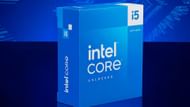The AMD Ryzen 7 9800X3D and Core i5-14600K are some of the most popular gaming CPUs in today's market. However, these chips are fundamentally different in terms of their design and the markets they target. While the 14600K has been handsomely discounted to less than $170 in 2025, adding to its allure, the 9800X3D uses the latest innovations in CPU technology to deliver the best performance.
Which approach makes for a better gaming CPU for mid-range systems, though? Let's dissect the chips in detail to answer that.
The AMD Ryzen 7 9800X3D and Intel Core i5-14600K are some of the most popular gaming CPUs in 2025

The 9800X3D and Core i5-14600K are based on wildly different in terms of underlying technologies. While AMD uses the latest chiplet-based Zen 5 architecture with 3D V-cache, the older 14600K is a refinement of the monolithic Raptor Lake-based processor.
Specs comparison
On paper, both the Ryzen 7 9800X3D and Core i5-14600K are well-endowed. While the AMD processor has eight cores and 16 threads, the Intel processor bundles 14 cores in a hybrid format. Six of these are high-performance "P" rated, while the other eight are efficient "E" rated.
In terms of maximum boost speeds, the Ryzen 7 9800X3D does up to 5.2 GHz. The number is significantly lower than other high-end Ryzen 9000 chips to accommodate the 3D V-cache, which destabilizes cores.
The 14600K clocks are higher than the AMD chip. Its six P cores do a maximum of 5.3 GHz, with the E cores hitting 4 GHz. However, the extra operating hardware on the Intel chips makes it a bit more power hungry. It easily draws northwards of 150W under full load, while the 9800X3D more strictly adheres to its 120W typical operating power.
Here are the specs and details of the two chips:
In terms of pricing, the i5-14600K goes for about a third of what the 9800X3D is selling for. While the latter is maintaining its $479 launch MSRP for now, Intel has aggressively discounted some of its older chips, like the Core i5, to stay competitive against AMD.
Performance comparison

Here's how the two chips compare in terms of gaming performance at 4K Ultra settings, alongside the slightly cheaper but still stocked Ryzen 7 7800X3D. The tests were conducted with an RTX 3090 Ti GPU. We sourced the data from the YouTube channel Mark PC.
The Ryzen 7 9800X3D, on average, is 27.4% faster than the Core i5-14600K. The Intel chip fails to secure a win in any game. The largest gains are seen in more CPU-heavy titles like Assassin's Creed Valhalla (+42.7%), Cyberpunk 2077 (+35.2%), and Watch Dogs Legion (+29.9%). Here's how the geomean FPS ranks:
- Ryzen 7 9800X3D: 125.8 FPS
- Ryzen 7 7800X3D: 110.0 FPS
- Intel Core i5-14600K: 99.1 FPS
Moving up from the 14600K to the 9800X3D delivers performance gains large enough to feel like a GPU upgrade. However, this may only be the case if you're not limited by the GPU (something northwards of the RTX 4080 Super/5080). Else, the $300 you can save by opting for the Core i5 can translate to a handsome GPU upgrade, which would deliver gains much greater than 27.4%.
The story changes when examining frame-time consistency. In 1% lows, the Intel i5-14600K (77.2 FPS) maintains a deficit as compared to the 9800X3D (92.8 FPS). In 0.1% lows, the Intel chip (69.8 FPS) is significantly faster than the 9800X3D (43.5 FPS). This means there will more microstutters on the AMD chip, but its average framerate is the best.
For budget-conscious gamers, paying a 183% price premium for 26.9% better performance doesn't make sense if a larger gain can be unlocked by spending more on a GPU. The 7800X3D makes an even worse case in this regard, costing a 112% price premium for just 11% better performance. This makes the Core i5-14600K the better choice as it costs an exceptional $1.71 per FPS.
With more high-end GPUs, the difference in overall experience depends even more on the more stable 1% and 0.1% low numbers. On top of this, the Intel processor also gives better stability. In comparison, the 7800X3D sits at $3.26 per FPS, while the 9800X3D is at $3.81 per FPS.
